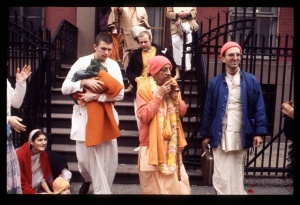SB 10.27.24: Difference between revisions
m (1 revision(s)) |
(Vanibot #0018 edit: make synonym terms in Sanskrit italic in SB - Vanisource) |
||
| Line 1: | Line 1: | ||
{{info | {{info | ||
|speaker= | |speaker=Śukadeva Gosvāmī | ||
|listener=King | |listener=King Parīkṣit | ||
}} | }} | ||
[[Category:Srimad-Bhagavatam - Canto 10 Chapter 27]] | |||
[[Category:Bhagavatam Verses Spoken by Sukadeva Gosvami - Vanisource|102724]] | |||
<div style="float:left">'''[[Srimad-Bhagavatam]] - [[SB 10|Tenth Canto]] - [[SB 10.27: Lord Indra and Mother Surabhi Offer Prayers|Chapter 27: Lord Indra and Mother Surabhi Offer Prayers]]'''</div> | |||
<div style="float:right">[[File:Go-previous.png|link=SB 10.27.22-23]] '''[[SB 10.27.22-23]] - [[SB 10.27.25]]''' [[File:Go-next.png|link=SB 10.27.25]]</div> | |||
{{RandomImage}} | |||
{{SBnotice}} | |||
==== TEXT 24 ==== | ==== TEXT 24 ==== | ||
<div | <div class="verse"> | ||
tatrāgatās tumburu-nāradādayo | :tatrāgatās tumburu-nāradādayo | ||
gandharva-vidyādhara-siddha-cāraṇāḥ | :gandharva-vidyādhara-siddha-cāraṇāḥ | ||
jagur yaśo loka-malāpahaṁ hareḥ | :jagur yaśo loka-malāpahaṁ hareḥ | ||
surāṅganāḥ sannanṛtur mudānvitāḥ | :surāṅganāḥ sannanṛtur mudānvitāḥ | ||
</div> | </div> | ||
| Line 17: | Line 22: | ||
==== SYNONYMS ==== | ==== SYNONYMS ==== | ||
<div | <div class="synonyms"> | ||
''tatra''—to that place; ''āgatāḥ''—coming; ''tumburu''—the Gandharva named Tumburu; ''nārada''—Nārada Muni; ''ādayaḥ''—and other demigods; ''gandharva-vidyādhara-siddha-cāraṇāḥ''—the Gandharvas, Vidyādharas, Siddhas and Cāraṇas; ''jaguḥ''—sang; ''yaśaḥ''—the glories; ''loka''—of the entire world; ''mala''—the contamination; ''apaham''—which eradicate; ''hareḥ''—of Lord Hari; ''sura''—-of the demigods; ''aṅganāḥ''—the wives; ''sannanṛtuḥ''—danced together; ''mudā anvitāḥ''—filled with joy. | |||
</div> | </div> | ||
{{SBcollapse}} | |||
==== TRANSLATION ==== | ==== TRANSLATION ==== | ||
<div | <div class="translation"> | ||
Tumburu, Nārada and other Gandharvas, along with the Vidyādharas, Siddhas and Cāraṇas, came there to sing the glories of Lord Hari, which purify the entire world. And the wives of the demigods, filled with joy, danced together in the Lord's honor. | Tumburu, Nārada and other Gandharvas, along with the Vidyādharas, Siddhas and Cāraṇas, came there to sing the glories of Lord Hari, which purify the entire world. And the wives of the demigods, filled with joy, danced together in the Lord's honor. | ||
</div> | </div> | ||
__NOTOC__ | </div> | ||
</div> | |||
<div style="float:right">[[File:Go-previous.png|link=SB 10.27.22-23]] '''[[SB 10.27.22-23]] - [[SB 10.27.25]]''' [[File:Go-next.png|link=SB 10.27.25]]</div> | |||
__NOTOC__ | |||
__NOEDITSECTION__ | |||
Revision as of 13:49, 1 December 2017

A.C. Bhaktivedanta Swami Prabhupada
Please note: The synonyms, translation and purport of this verse were composed by disciples of Śrīla Prabhupāda
TEXT 24
- tatrāgatās tumburu-nāradādayo
- gandharva-vidyādhara-siddha-cāraṇāḥ
- jagur yaśo loka-malāpahaṁ hareḥ
- surāṅganāḥ sannanṛtur mudānvitāḥ
SYNONYMS
tatra—to that place; āgatāḥ—coming; tumburu—the Gandharva named Tumburu; nārada—Nārada Muni; ādayaḥ—and other demigods; gandharva-vidyādhara-siddha-cāraṇāḥ—the Gandharvas, Vidyādharas, Siddhas and Cāraṇas; jaguḥ—sang; yaśaḥ—the glories; loka—of the entire world; mala—the contamination; apaham—which eradicate; hareḥ—of Lord Hari; sura—-of the demigods; aṅganāḥ—the wives; sannanṛtuḥ—danced together; mudā anvitāḥ—filled with joy.
Translation and purport composed by disciples of Śrīla Prabhupāda
TRANSLATION
Tumburu, Nārada and other Gandharvas, along with the Vidyādharas, Siddhas and Cāraṇas, came there to sing the glories of Lord Hari, which purify the entire world. And the wives of the demigods, filled with joy, danced together in the Lord's honor.